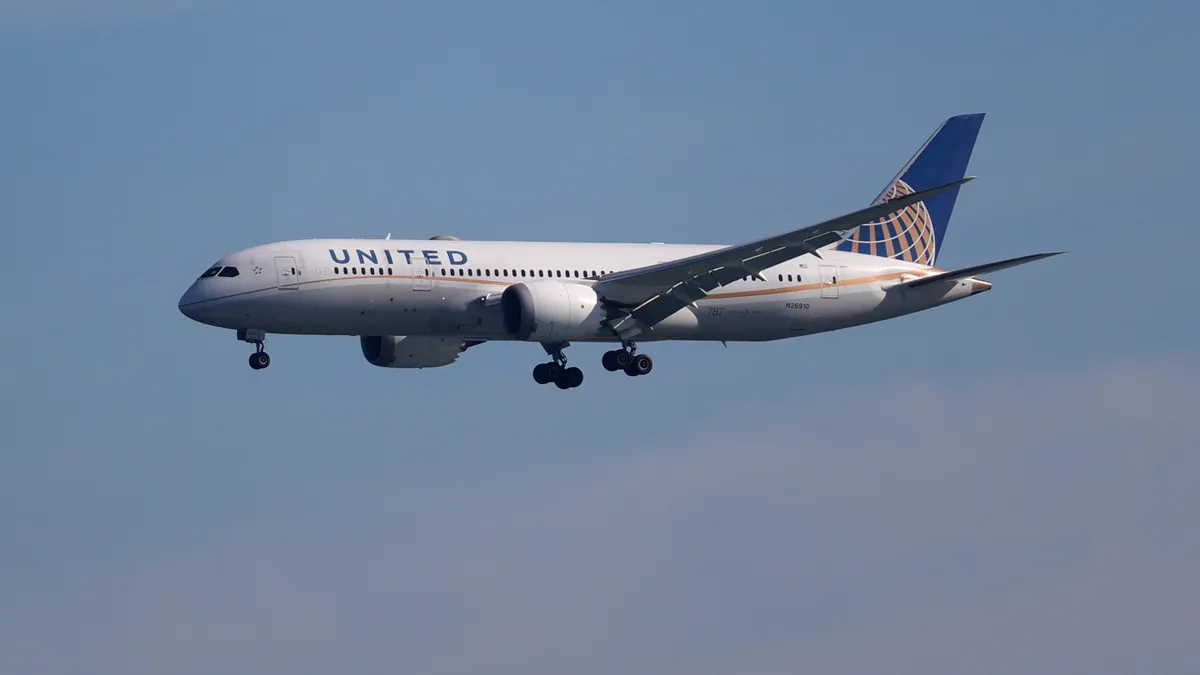Dive Brief:
- United Airlines plans to establish a new flight simulator building in Denver, Colorado that will be up and running by 2027, a move that follows rumors of a potential headquarters shift sparked by its $33 million purchase of land in the city last August.
- The facility will include approximately 12 full flight simulators, according to plans submitted to the city as reported by the Denver Post. The Denver property offers the airline, currently based in Chicago, Illinois, further opportunities for growth, the company said in a statement, without commenting on a potential headquarters move.
- “We have been in Chicago for decades and have thousands of employees here,” United Airlines said in a statement sent to CFO Dive. “The land in Denver gives us options for the future as we implement our big plans to grow.”
Dive Insight:
United executives have previously downplayed a potential headquarters shift from their current space in Chicago’s landmark Willis Tower. In September, then-CFO Gerald Laderman stated there were “no imminent plans” to shift its headquarters, speaking during a conference held in Boston, CFO Dive previously reported. Laderman also noted United had already “outgrown” its current space in Denver; the airline already trains approximately 16,500 pilots annually in its flight training center located on the city’s Quebec Street, according to the Denver Post.
However, there exists an “immediate need” to create the new simulator building which will be located on the company’s Tower Road and 64th Avenue property, according to the plans filed by United and ZGF Architects, per the Denver Post.
Construction of the new facility is part of “Phase 1” of United’s plans in Denver, with the company also “actively investigating” needs to “support campus activity accommodating 5,000 employees in future phases of the project,” according to the plan document. The airline is Denver’s largest employer with approximately 10,000 employees in the city after it broke ground on another new training facility in June, as reported by Reuters.
A potential jump from Chicago to Denver would represent another blow to Chicago’s commercial real estate and business sectors.
Chicago saw an exodus of top companies in 2022, including fellow aerospace company Boeing, as well as Caterpillar and Citadel with the companies uprooting for reasons from inflationary pressures to a rise in crime, CFO Dive previously reported. In 2019, United extended its lease in Chicago’s Willis Tower for 14 years, but downsized its presence in the building by three floors in 2020 amid headcount reductions sparked by the impacts of the COVID-19 pandemic.
Real estate and office costs remain top of mind for CFOs still facing inflationary pressures that are hampering margins. Cutting down on real estate expenses is one way finance chiefs may be able to balance rising cost pressures; U.S. regulators recently flagged the commercial real estate space as a key risk for financial stability coming into 2024, CFO Dive previously reported. High vacancy rates as well as slumping property values were both factors contributing to weakness in the market, regulators noted.
“The industry is facing cost pressures, inflationary cost pressures, labor cost pressures, maintenance cost pressures,” current CFO Michael Leskinen said during the company’s earnings call for its fiscal third quarter. A company alum, Leskinen took the top financial seat in September after Laderman announced his intent to retire in May, according to a filing with the Securities and Exchange Commission.
“What I will commit to today is that United will be industry-leading in how we manage our costs,” Leskinen said during the earnings call. United declined to give 2024 guidance during the call.
For its third quarter, United reported record profits in both its Atlantic and Pacific regions, reporting total operating revenue of $14.5 billion, a 12.5% jump compared to the prior period, according to its earnings results, as well as $1.1 billion in net income. United also noted that it had achieved “significant growth in the Denver market,” for the quarter, which included reaching 300 daily departures, the highest mainline departures in two decades, as well as a 10% bump in seat capacity growth year-over-year.
The Denver property provides United with “lots of options” for future growth, the airline told CFO Dive in a statement sent via email.
“For example, we’ve already begun work on plans to use part of this land as the site for the expansion of our world-class Denver pilot training facility and we’ll evaluate additional opportunities in the future as our United Next plan unfolds,” the airline said. United is aiming to have some of its new flight simulators ready for 2028, it said.
ZGF Architects did not immediately respond to a request for comment.












